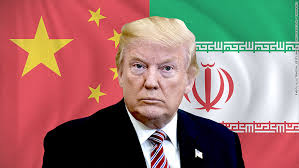China is the big wild card in Trump’s Iran decision

President Donald Trump put Iran back in the penalty box on Tuesday — but the impact on the oil market could be determined by how China responds.
China, a voracious consumer of oil, holds great sway because it’s Iran’s biggest customer. Almost one-third of Iranian oil shipments this year have gone to China, according to energy research firm Genscape.
Trump announced his intent on Tuesday to quit the Iran nuclear deal and reimpose sanctions on the country.
Oil prices shot up in the weeks before Trump’s well-telegraphed decision. Traders placed bets that Trump’s tough stance on Tehran would significantly reduce the flow of crude from Iran, just as a global oil glut appears to be coming to an end. Up to 1 million barrels per day of Iranian crude are at stake.
The United States imports no crude directly from Iran. And there is no guarantee that Iran’s major customers will comply with new sanctions. Even close allies in the European Union are signaling frustration with Trump’s decision.
Related: What Trump’s Iran decision means for oil and gas prices
Beijing could be even less likely to go along.
Not only does China’s fast-growing economy have an enormous thirst for oil, but Beijing and Washington remain locked in an unpredictable trade dispute. China may have little interest in doing Trump a favor by sidelining Iran, even if Washington threatens penalties for countries that do business with Tehran.
“Given the back and forth between China and the US on trade, Chinese compliance is probably a nonstarter,” said Michael Tran, global energy strategist at RBC Capital Markets.
Trump has vowed to impose tariffs on China in response to the country’s trade practices and alleged theft of intellectual property. The two countries are in talks, but appear to be far apart on major issues.
“The US may have a harder time getting China to reduce its imports given Trump’s tense relationship with Beijing,” Thomas Pugh, commodities economist at Capital Economics, wrote in a report on Tuesday.
Energy analysts expect other major customers of Iran — including close US allies Japan and South Korea — to adhere more closely to new sanctions.
If the new sanctions cause European nations to cut back or even stop buying Iran’s oil, it would leave more crude for China to buy, possibly at a discount.
“China is potentially the country most likely to benefit from sanctions being placed back on Iran,” said Matt Smith, director of commodity research at ClipperData.
Related: Iran deal: Who loses as US sanctions return
China regularly purchased crude oil from Iran, even when the country was still under sanctions. China imported an average of 420,000 barrels per day in 2014 and then 481,000 barrels per day in 2015, according to ClipperData.
While China cut back on its Iranian imports last year, it has been buying more lately as the nuclear decision loomed. Iran delivered 766,000 barrels per day to China in March and nearly 700,000 barrels per day in April, according to ClipperData.
Iran’s surge of exports was likely an “attempt to beat the sanctions,” Smith said.
Without China on board, efforts to punish Iran may lack teeth. And the impact on the global oil market may be less dramatic than some feared.
Iran’s crude oil exports surged by 1 million barrels per day after the nuclear deal took effect in early 2016. The flood of supply came at precisely the wrong time for the oil market: excess supply was already depressing prices at the time.
The oil market has done a 180 since then, due in large part to OPEC and Russia’s agreement to cut production. Demand has also been very strong, thanks to economic momentum in the United States and abroad.
